- Home
- Jim Thompson
The Transgressors Page 4
The Transgressors Read online
Page 4
“Mr. Lord!” McBride’s head snapped around. “I was a combat infantryman during World War II! I spent one year in a German hell camp!”
“And I guess it didn’t learn you a thing,” Lord said sadly. “Didn’t teach you that a man’s got certain obligations to do what’s right, regardless of whether it’s convenient or what the law will let him get away with. Well”—he opened the car door and paused as he slid from the seat—“I guess I’ll just have to plug up a few holes in your ed-u-cation, Mis-ter McBride. Looks like it was my bounden duty.”
He nodded, grinning coldly, and departed.
It was two weeks later that, having caught McBride without a gun permit, and McBride having “resisted arrest,” he beat him insensible.
And now he was face to face with McBride again. And McBride’s gun was aimed at him.
And McBride, obviously, was more than prepared to use it.
All he needed was a reason, an excuse, the slightest provocation or justification.
Perhaps, judging by the half-crazed look in his eyes, he did not even need that.
4
In retrospect, it seemed to Tom Lord that there were a dozen ways that he could have handled the situation, any of them better than the one he chose. But that was later. At the time, he was not even conscious of making a choice; what he did was inevitable, a course that was thrust upon him. At the time he could think of only one thing: that he had made the biggest mistake of his life in coming here. That he should never have come here, regardless of his need to, or of his nagging anger with McBride.
The facts were, of course, that he would not have done so if he had been aware of the severed cable and the drill tools lost down the hole. He would have realized that McBride would blame him for the disaster, that he would take this—a seeming attack on his, McBride’s, work and company responsibilities—every bit as hard as, or harder than, he had taken the beating.
But Lord hadn’t known about the lost tools. And there was no way now to compensate for this vital bit of ignorance.
He should have got away from the place faster. He simply shouldn’t have been there to begin with.
“I want to tell you something,” Lord heard himself saying. “I didn’t cut your drill cable. I can prove that I was in town all last night.”
McBride’s lips drew back from his teeth in a broad, humorless grin. He laughed a high-pitched cackling laugh.
“Yes, you can,” he said. “I’m sure of it. You’d lie and the whole town would swear to it.”
He had aged ten years since the beating, Lord saw. He had lost almost forty pounds. He was haggard and deathly sick-looking, a man disintegrating under the conflicts of his job and his conscience. Lord had made him see the basic wrong of his existence, the only one he had ever lived or was capable of living. And because Lord had done so, and because he himself could not accept the responsibility, it became Lord’s fault.
Everything. All of it…That woman in the compensation court, where he had testified for the company. That Negro ’cropper, watching dully as the huge tractors rolled through the family burial plot. The way his men looked at him. The way his dead wife had treated him. The…the starved bodies hanging in the barbed wire, and the long trench with the bubbling quicklime and the smell of roasting flesh, and…
“I had a broken spring on my car,” Lord said very slowly, letting each word sink in. “I had to come here for help. I was going to pay for everything I used or broke.”
McBride let out another high-pitched cackle. He said that, of course, that was the way it was and that was what Lord had intended to do. It was a lie, but Red and Curly and the woman would swear to it.
“You,” he said, his voice suddenly sharp, slanting a glance at the two workmen. “You’ve drawn your pay. Now I’ll give you ten minutes to get off this lease.”
“We’re sticking with Tom,” Norton said. “We figure—”
McBride swerved the gun abruptly and let loose a shot between them. Then, as they fell back, he swung the gun back on Lord.
“You’re my prisoner,” he said. “I’m making a citizen’s arrest.”
“You can do that,” Lord said. “Don’t make much sense, though.”
“Trespassing!” said McBride. “Willful destruction of property!” His voice rose. “Breaking and entering!” Now yelling. “Larceny!”—screaming.
The screaming continued through a jumbled, run-together, incoherent mass of accusations. And then, abruptly, he began to giggle. This went on for a full minute, then ended as suddenly as the screaming had.
“You there,” he said, jerking his head at Joyce. “Get that piece of rope and tie your boy friend’s hands behind him.”
Joyce smirked nervously, either unable or unwilling to follow the command. Lord caught her eye, silently indicated that she was to obey. But still she could not or would not.
McBride eyed her terribly, the cords in his throat swelling. “Do you hear me, you whore? Do as I tell you!”
“W-Whore?” Joyce suddenly came to life. “You calling me a whore, mister?”
“Yes, whore!” McBride seemed to delight in the word. “The lowest kind of whore! A filthy, slimy whore! A cheap, stinking, rotten—”
She was not an unduly sensitive person, except where her own feelings were concerned. Neither was she inclined to look ahead to the potential consequences of her acts. This character had called her a whore. She didn’t take that kind of talk from anyone; period; end of story.
She was gripping her purse in her right hand. Without a word, in one furious unbroken motion, she drew her arm back, swung, and let go. The heavy bag zipped toward him, trailing a tinkling stream of cosmetics, bobby pins, and small change. Instinctively, he threw up his arms to ward it off.
In the next instant, Lord hit him with a flying tackle. McBride dropped like a rock, but he held onto the gun. He and the deputy went rolling and sprawling among the weeds. They came to their feet, and were as quickly down again, scrambled together in a struggling, tangled mass of flailing feet and slugging fists. It was impossible to intervene, but Joyce moved closer, eyes still blazing with offended dignity, and the two oil-field workers stood poised alertly, ready to leap into the fray at the slightest opportunity.
Then, the gun began to explode, and the three scampered backward. They were still running, heads ducked, bodies crouched, when there was a final shot, dully muffled this time.
And then there was silence.
McBride lay spread-eagled on his back, his outflung right hand still gripping the gun. Lord was slowly rising from his body, staring down at him. Then, jerkily pulling his gaze away, he brushed his mouth with the back of his hand. Dully he watched the approach of Joyce and his two friends.
Joyce was the first to reach the body. She took a quick glance at it, then spoke, half-defiantly, a small sob in her throat. “He shouldn’t have done that. H-He had no right to call me a whore.”
“He sure shouldn’t have,” Lord agreed. “He sure didn’t.”
“We shouldn’t have come here in the first place! I told you we shouldn’t! I begged and pleaded and—and—”
She began to weep, childlike, hands hanging at her sides, great glossy tears squeezing from her squinted-shut eyes. Lord took her by the shoulders and gently helped her into the car. Forcing a reassuring smile, he dabbed at her tears with a polka-dot bandanna.
“Better now, honey? Want to honk the old schnozzle?” He held the handkerchief while she blew into it. “What about old Tom gettin’ you a drink of water?”
“I—I g-guess not. I’ll j-just”—She got a look at herself in the car mirror—“oh, my God! Just look at me! Now, where is my—”
“You just sit tight. I’ll get it for you.”
He gathered up the contents of her purse, making sure that nothing was left behind. She grabbed the compact from him and went to work with it almost feverishly. Tom’s mouth twisted as he turned away. She called to him sharply.
“Now, where do you think you’re
going? Let’s get out of here!”
“We will. Got a little talkin’ to do first.”
“What’s there to talk about? He’s dead isn’t he?”
“I reckon. Be pretty hard to live with no brains in his head.”
She made a disgusted, sickish sound. Curly and Red looked up from the body as he approached them, then moved away at an angle as he nodded his head, joining him as he went up a gentle rise in the land and paused, back turned, at the crest.
“Didn’t want to look at him no more,” he explained. “Just didn’t feel like I could take it.”
They murmured sympathetically. Red asked him how it had happened.
“I don’t rightly know; everything happened so fast. Of course, I was trying to get the gun away from him, but I don’t think I had a hold of it when he got killed. Just seemed like he flung it against his head and pulled the trigger.”
“It wasn’t your blame, Tom.”
“Well, it sure wasn’t intentional. But it wouldn’t have happened if I hadn’t been here.”
“You got no call to blame yourself,” Curly insisted, “an’ nobody can fault you for it. Any trouble about it, you got us and the lady to tell what happened.”
“You think about that for a minute,” Lord said. “See if you can’t find just a leetle somethin’ wrong with the picture.”
He rubbed his eyes tiredly, looked down the slope among a stand of blackjack trees. Several oblongs of natural rock had been laid there, abutting to form a building foundation. Affixed to them were the edge-up timbers of the studding.
“McBride’s house,” Norton answered his silent question. “He was bringin’ his wife out here as soon as she had her baby. Wanted to have ’em a good long way from town, I reckon.”
“I thought his wife was dead.”
“This is his second one. Used to be what you’d call his ward, I guess.” Norton grinned feebly. “One way of gettin’ a wife. Raise her yourself.”
Lord looked down at the ground. Curly frowned at Red.
“About what you was sayin’ a minute ago, Tom. What…?”
“Well, suppose the killin’ had been my fault. You’re my friends, and you didn’t have no use for McBride. What would your story have been?”
“Well…” said Curly. “Oh, yeah, I see what you mean.”
“You’re sayin’,” said Norton, “that our word don’t amount to nothin’?” He frowned, scratched his head uneasily. “Come to think about it, I guess it don’t either.”
“Oh, it amounts to something, all right. If you said this was all my fault, folks’d believe you right off. It’s only if you back me up that they won’t.”
“What do you want to do, Tom?”
“Well, that kinda depends on you boys. Don’t want you puttin’ your tail in a sling for me, but…”
He explained his plan. The two men were agreeing to it long before he had finished. He was not asking them to perjure themselves; only to say nothing unless he later told them to. And that seemed safe enough. They had been fired along with the other workmen on the well. Like the others, they could have left soon after the firing; they could have no knowledge of McBride’s death or, of course, of Lord’s presence at the well. Someone would be stopping by the lease tomorrow; some supply man or mud-washer [geologist] or company scout. Let him discover the body, and report it.
Red and Curley were both confident that the scheme would work. Lord was not so sure, but conceded that the death did look like suicide.
“And it kind of was in a way,” he added dully. “Might be it really was.”
They walked back down the hill with him. They shook hands. As he drove off, they were hastily repairing the tool-house door and disposing of the other mementos of his visit.
With the approach of sunset, the August evening had turned cool. And as the sun dropped abruptly below the horizon, the cool became cold. Lord put up the car top and closed the windows. Then, moodily, he drove on again.
He had hardly spoken since leaving the lease. Now, as Joyce began to prod him insistently, he told her of his talk with Red and Curly and about what they had agreed.
She started to nod. Then, instead, her eyes narrowing slightly, she withdrew to her own side of the seat and sat there, looking straight ahead, a strange primness modifying the lines of her hard-pretty face. Lord gave her a quickly covert look. Grinning sadly to himself, he fumbled for a cigar, found none, and dug a wooden match from his pocket. He tucked it into the corner of his mouth and began to chew on it.
“ ’Course, I didn’t ask how you felt about it,” he observed. “Didn’t figure I had to. Just thought you’d go along with whatever I said.”
“We-el, I’d certainly like to, Tom. You know I’m always anxious to do whatever you want.”
“Uh-huh?”
“I—I’m not what I used to be, Tom. I haven’t been since we started going together.”
“So I noticed,” Lord said. “Been wonderin’ how you got by fi-nan-shelly.”
“Well, I haven’t been really. I’ve had to do without a lot. But I haven’t minded. I’d do anything for you, Tom; anything! But maybe—well, you know—a girl like me, a girl that’s been what I’ve been…”
Lord’s grin became open. He gave her a jovial slap on the thigh. “Now, why don’t you just come right out and say it? Shouldn’t be so hard. Might choke on it, if you hold it in any longer.”
“Well.” Joyce took a deep breath, bracing herself. “We’d better get married, Tom. A woman can’t testify against her own husband.”
Lord nodded; he said idly, “There’s something else a woman can’t do.”
“Yes?”
“She can’t testify if she’s dead.”
5
Aaron McBride’s second wife, Donna, was the oldest of fourteen children, five of whom were still alive. At the age of fifty, her mother became pregnant with the fifteenth child, and died during its gestation. Her father promptly abandoned the family and went on about his career of True Gospel preaching. The younger children were taken into an orphanage. Being old enough to be “useful,” as well as a distant relative of McBride’s wife, Donna found refuge in his household.
Donna earned her keep, and then some. She was only thirteen at the time, but she had been doing a woman’s work for years—assuming a woman’s responsibilities except the marital ones. Mrs. McBride firmly encouraged her to continue doing the first, and gradually allowed her to take over the second.
Mrs. McBride’s health was poor; she had little interest in pleasing her husband. She could not say why—not exactly why—she felt as she did about him. He was a good provider, and an unswervingly faithful and undemanding husband. Most of the time he was away in the fields, while she lived comfortably, almost luxuriously, in Fort Worth. Still, she could barely tolerate him. She dreaded his visits home, and was always glad to see him leave. And Aaron McBride knew it.
He had had no home, in the true meaning of the word, until Donna’s coming. She gave him one. While Mrs. McBride, after allowing her cheek to be kissed and a few polite formalities, withdrew to her bedroom, Donna saw to his needs—fixing his meals, taking care of his laundry, talking to him, and encouraging him to talk as long as he wished: doing everything she could to make him feel welcome and wanted.
She was grateful for the opportunity to do things for him. It seemed to her that she could never do enough. He was the father she had never had—the strong, wise, and good friend who could have been no more interested in her welfare if she had been his own daughter.
At his expense she received extensive medical and dental treatment. At his expense her near-illiteracy was overcome; she was cram-tutored, made able to enter high school only a year or so behind her age group. She worked hard around the house, but he would not allow her to become a drudge. She was to have ample time for her studies, and time and money for at least a few of the pleasures that other girls enjoyed. And he was unusually firm with his wife when she showed resentment at his “coddling,�
�� or attempted to oppose his wishes.
So Donna’s affection for the man, her gratitude to him, were completely in order. She did not see how she could ever do enough to repay the debt she owed him.
When, following his wife’s death, a means of repayment seemed open to her, she almost snatched at the opportunity.
Love? Did she love him? Well, of course, she did! How could she help herself, and who else would she love if not him? He was twenty-five years older than she, but that made no difference. He was young enough for her, and she was old enough for him.
After their marriage and a brief honeymoon in Fort Worth, he returned to the oil fields. She planned to join him as soon as he could find suitable living quarters and was sure of remaining in one place for a time. But even as she prepared to leave the Fort Worth residence, he advised her to remain there. He did not explain why. She did not ask. He would have his reasons; when he was ready, he would tell her what they were, and she was content to wait until he did.
A scrupulously honest man, by his own code, he intended to tell her about the beating and what it had done to him, inwardly. She was his wife; she had a right to know. And he hungered for her sympathy, her assurance that he was right—that what he had lived by was right, and that Lord was wrong. But he was too reserved to make a direct appeal to her, and, at any rate, he could not find the right words. It was a simple thing, seemingly: he had had a fight as a result of a business misunderstanding. But it was all mixed up in his mind, and he could not talk about it. Lord had confused him as badly as he had beaten him.
On one of his quick visits home, he did approach the subject obliquely, attempting by means of a hypothesis, in which he was determinedly fair to the deputy, to get her opinion as to his rightness and Lord’s wrongness:
Lord, he told her, was doubtless a good man at heart. Everyone spoke well of him, and he deserved much more than life had given him. On the other hand—well, wasn’t his life his own lookout? Was anyone obligated to look out for his interests, to their own disadvantage perhaps, if he could not do so himself?

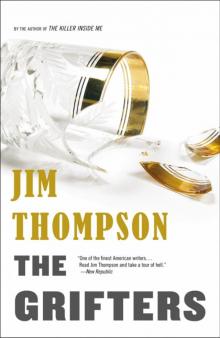 The Grifters
The Grifters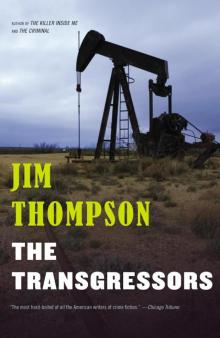 The Transgressors
The Transgressors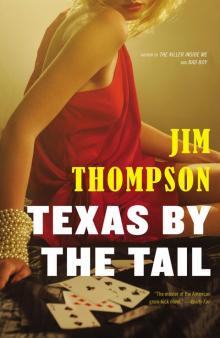 Texas by the Tail
Texas by the Tail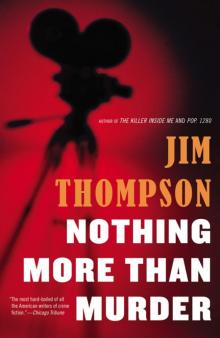 Nothing More Than Murder
Nothing More Than Murder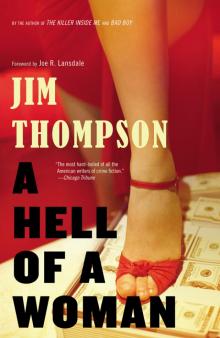 A Hell of a Woman
A Hell of a Woman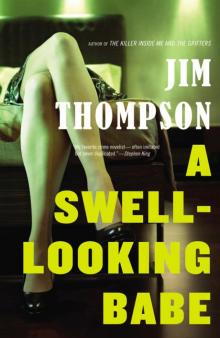 A Swell-Looking Babe
A Swell-Looking Babe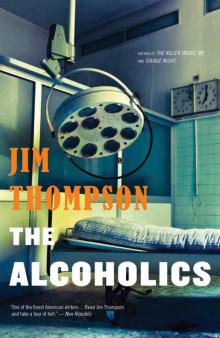 The Alcoholics
The Alcoholics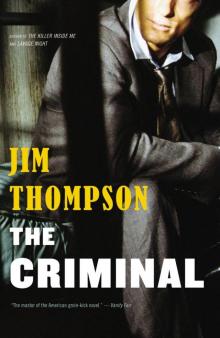 The Criminal
The Criminal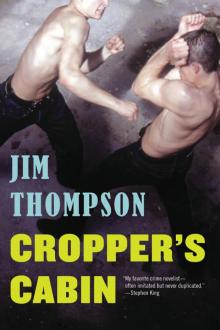 Cropper's Cabin
Cropper's Cabin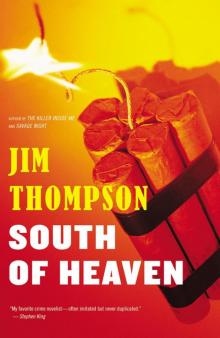 South of Heaven
South of Heaven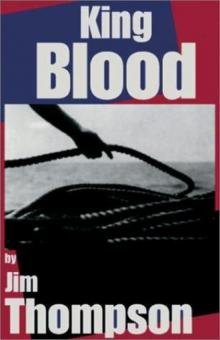 King Blood
King Blood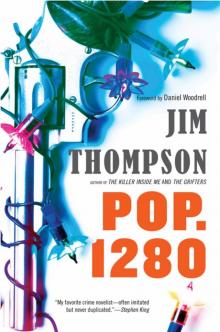 Pop. 1280
Pop. 1280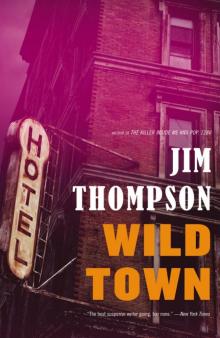 Wild Town
Wild Town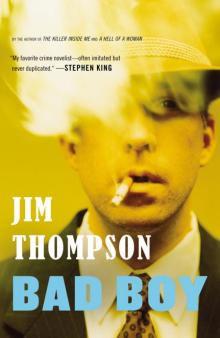 Bad Boy
Bad Boy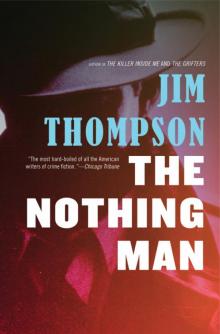 The Nothing Man
The Nothing Man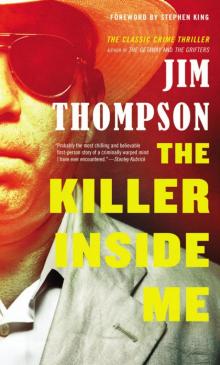 The Killer Inside Me
The Killer Inside Me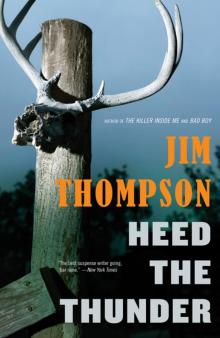 Heed the Thunder
Heed the Thunder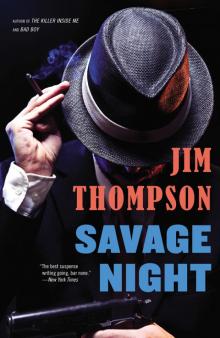 Savage Night
Savage Night Recoil
Recoil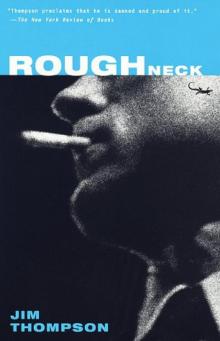 Roughneck
Roughneck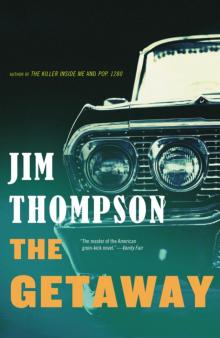 The Getaway
The Getaway